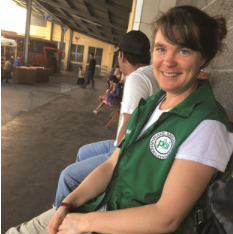
Our colleagues at PBI-Deutschland have just published this firsthand account from Mieke Wolter and we present these excerpts in English:
“At the end of March 2019, I went to Honduras as a PBI volunteer for a year. The house of the volunteers in which I lived and worked is in the capital Tegucigalpa where the offices of four of the six organizations currently supported by PBI are also based.
The accompaniment of local human rights defenders was often very inspiring, invigorating and encouraging. I asked myself: How can it be that a person who has already experienced so much hostility from different quarters can still be so humorous and unswerving?
There was always feedback from the human rights defenders we accompanied that the presence of PBI was very valuable. We were often told that without our presence they would be exposed to far more attacks and hostility or even be dead.
The accompaniment of PBI creates a shelter in which the activists can campaign for human rights in their country. Through the international interest, which can obviously be recognized through the physical presence, they experience an appreciation of their work for human rights. It becomes clear that human rights are taken seriously here.
In addition to the accompaniment to various events (rallies, court hearings, etc.) and the meetings with national and international authorities (mayor, police, military, national alliance for human rights, embassies), there was also a lot of work in the office – this included extensive work decision-making processes, in particular the meticulous recording of all relevant information.
A large part of the accompaniments of human rights defenders took place in the capital Tegucigalpa, but there were also requests for accompaniments from rural regions of the country. This is how I remember the accompaniment of CEHPRODEC (the Honduran Centre for the Promotion of Community Development).
CEHPRODEC offers technical and legal advice to rural and indigenous communities and facilitates organizational, training and protection processes through its work. The major problem facing many rural communities across Honduras is that mining projects and dams are often built without an adequate, free and informed process of prior consultation with the affected population.
[Likewise] the CNTC (National Union of Rural Workers) accompanies farmers who are being prosecuted for refusing to leave the land they have been cultivating for decades. Often it concerns areas that are to be sold to transnational energy companies, for example, and that are cleared with the help of private security personnel or the police.
We have therefore often accompanied CNTC members in court proceedings. In doing so, I often felt faint, because dates for the announcement of the verdict were regularly postponed; a common tactic to continue harassing farmers.
I am glad that organizations like PBI help to preserve and protect these spaces and that I was able to contribute to this as part of my volunteer work.”
The full article in German can be read on the PBI-Deutschland website at: Honduras: Tortilla y frijoles – Ein Jahr als Freiwillige für pbi.

